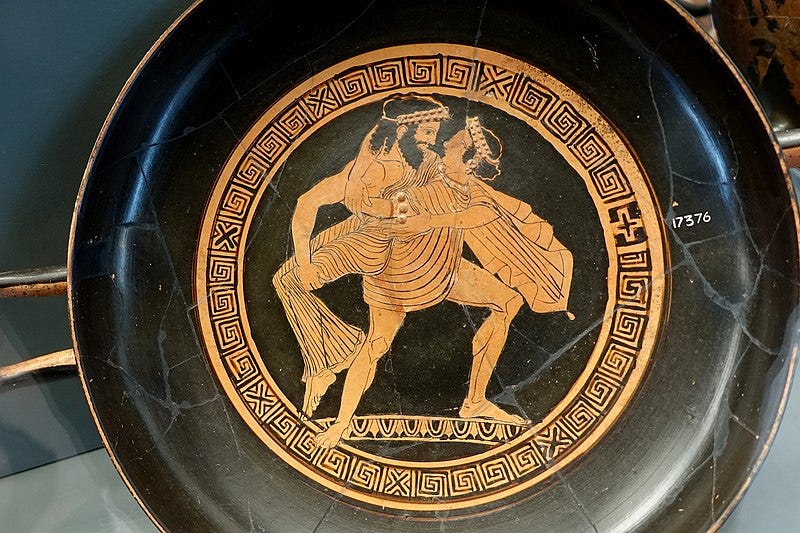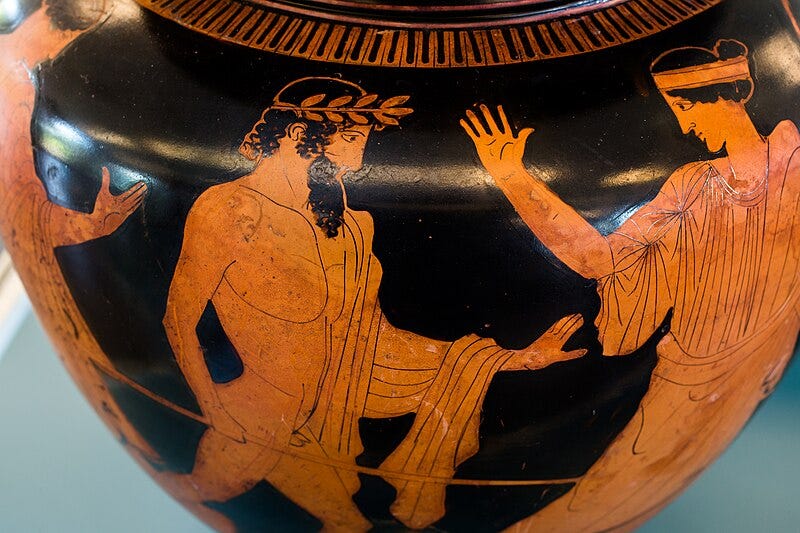This post is a basic introduction to reading Iliad 8. Here is a link to the overview of book 7 and another to the plan in general. As a reminder, these posts will remain free, but there is an option to be a financial supporter. All proceeds from the substack are donated to classics adjacent non-profits on a monthly basis.
Book 8 returns the Iliad to battle. It begins with a divine council, where Zeus attempts to control the actions of the other gods and by doing so, shapes the plot to come. The violence inspires Hera to try to disobey Zeus’ injunction, resulting in the flow of battle first favoring the Trojans and then the Greeks. Zeus has Iris prevent Athena and Hera from engaging further in the battle and the end of the book features two important moments: Zeus reveals his plan to the rest of the gods for the sides to struggle until Patroklos dies; Hektor has the Trojans camp outside the city for the first time in the conflict. The plot of this book engages critically with the major themes I have noted to follow in reading the Iliad: (1) Politics, (2) Heroism; (3) Gods and Humans; (4) Family & Friends; (5) Narrative Traditions. But the central themes I emphasize in reading and teaching book 8 are Gods and Humans and Narrative Traditions.
Zeus and the Plot of the Iliad
As I discuss in the introductory post on book 4, Zeus is instrumental in shaping the plot of the Iliad. The epic is cast as part of his “plan” in book 1, but he also articulates the plot of the epic at several key moments. There are different ways to think about Zeus’ intervention: As Bruce Heiden argues, we too often think about the Iliad as a text to be read, rather than one that was performed. The performance units are unknown to us: certainly, parts of epic narrative circulated as episodes (the teikhomakhia, “battle around the wall”; or teikhoskopia, “viewing from the walls”) but we can’t know from ancient references to such scenes whether they correspond to the same scenes we have in the written texts. Some have proposed that the book divisions we have were also performance units, but few of the books exhibit a kind of clear beginning, middle and end that would lend themselves to such performances.
Based on the three days of performances at the City Dionysia in Athens, some scholars have suggested a three-part sequence in a ‘monumental’ or ideal performance of the Iliad in some sort of a religious festival. There are several proposals, but the one I have always found most persuasive is Heiden’s: he remarks that Zeus has significant decisions and speeches in books 1 and 24, to begin and end and shape the plot, but that he also outlines the plot to come for the first time: in the latter part of book 8, and the latter part of book 15. Each of these moments could be seen as a ‘teaser’ for the next performance, outlining or anticipating the narrative to come in the same way a weekly television episode might end with “Next week, on [the Iliad]...” In this case, the performance units would be books 1-8, 9-15, and 16-24.
Now, even if we don’t subscribe to the tripartite performance structure, or, more importantly, if we acknowledge that the epic’s contents have not always been enjoyed in such a fashion, we can still see the effect that Zeus’s speeches have on the epic. He refocuses the action and dictates the plot.
Il. 8.469-483
“Then Zeus the cloud-gatherer answered Hera:
‘At dawn you will see the powerful son of Kronos,
If you want, cow-eyed Queen Hera,
Destroying the great host of spear-wielding Argives.
Hektor will not take a break from war until
The swift-footed son of Peleus rises among the ships
On that day when they battle among the prows
In the greatest strain over Patroklos who has died.
This is divinely decreed. I don’t care about whether
You are angry, not even if you run away to the ends
Of the earth and the sea, where Iapetos and Kronos
Sit and take pleasure neither in the rays of Helios
Nor in the winds, since Tartaros is steep around them.
Even if you go wandering there, I don’t care if you’re
Angry, since there’s no one more doglike than you.”Τὴν δ’ ἀπαμειβόμενος προσέφη νεφεληγερέτα Ζεύς·
ἠοῦς δὴ καὶ μᾶλλον ὑπερμενέα Κρονίωνα
ὄψεαι, αἴ κ’ ἐθέλῃσθα, βοῶπις πότνια ῞Ηρη
ὀλλύντ’ ᾿Αργείων πουλὺν στρατὸν αἰχμητάων·
οὐ γὰρ πρὶν πολέμου ἀποπαύσεται ὄβριμος ῞Εκτωρ
πρὶν ὄρθαι παρὰ ναῦφι ποδώκεα Πηλεΐωνα,
ἤματι τῷ ὅτ’ ἂν οἳ μὲν ἐπὶ πρύμνῃσι μάχωνται
στείνει ἐν αἰνοτάτῳ περὶ Πατρόκλοιο θανόντος·
ὣς γὰρ θέσφατόν ἐστι· σέθεν δ’ ἐγὼ οὐκ ἀλεγίζω
χωομένης, οὐδ’ εἴ κε τὰ νείατα πείραθ’ ἵκηαι
γαίης καὶ πόντοιο, ἵν’ ᾿Ιάπετός τε Κρόνος τε
ἥμενοι οὔτ’ αὐγῇς ῾Υπερίονος ᾿Ηελίοιο
τέρποντ’ οὔτ’ ἀνέμοισι, βαθὺς δέ τε Τάρταρος ἀμφίς·
οὐδ’ ἢν ἔνθ’ ἀφίκηαι ἀλωμένη, οὔ σευ ἔγωγε
σκυζομένης ἀλέγω, ἐπεὶ οὐ σέο κύντερον ἄλλο.
Zeus’ control of the plot, in an echo of his language at the beginning of books 4 and 8, is somehow related to his physical might and reminders of a theomachy that led to the Titans (or someone like them) being exiled to Tartarus. At the beginning of 8, he reminds the gods that they cannot overpower him and threatens to hurl anyone who disobeys him into the underworld (10-20). In book 4, Zeus is not explicit in threatening Hera, but he does imply he will destroy one of her favorite cities as payback for the destruction of Troy (4.25-30). Book 5 is replete with echoes of divine war; but book 8 seems the most explicit in bookending the action with references to the consequences of opposing Zeus. By flexing his rhetorical muscle, Zeus both forestalls any further action against him and clarifies the epic’s plot.
If we are imagining books 1-8 as a performance unit, this final speech closes Zeus’ response to Achilles’ request in book 1: Achilles asks for the Achaeans to be punished; here Zeus makes it clear that Patroklos’ death is a part of his honoring of that request. Of course, there interpretive space for understanding Zeus’ action. A scholiast explains for the phrase “this is divinely decreed” that “[Zeus] is tossing out that this is fated, so that he doesn’t seem to play the part of tyrant” τὸ μοιρίδιον προβάλλεται, ἵνα / μὴ δοκῇ τυραννεῖν, Schol. bT ad Hom. Il. 8.477). As if that settles it all!
On the performance of the Iliad and book 8
n.b this is not an exhaustive bibliography. If you’d like anything else included, please let me know. Follow-up posts will address book 8 and other traditions
Cook, Erwin F. “On the ‘Importance’ of Iliad Book 8.” Classical Philology, vol. 104, no. 2, 2009, pp. 133–61. JSTOR, https://doi.org/10.1086/605340
Fenno, Jonathan. “‘A Great Wave against the Stream’: Water Imagery in Iliadic Battle Scenes.” The American Journal of Philology 126, no. 4 (2005): 475–504. http://www.jstor.org/stable/3804872.
Foley, J. M. 1988. The Theory of Oral Composition: History and Methodology. Bloomington.
———. 1999. Homer’s Traditional Art. Philadelphia.
González, José M. 2013. The Epic Rhapsode and His Craft: Homeric Performance in a Diachronic Perspective. Washington, D.C.: Center for Hellenic Studies.
Heiden, B. (1996). The three movements of the iliad. Greek, Roman and Byzantine Studies, 37(1), 5-22. Retrieved from https://www.proquest.com/scholarly-journals/three-movements-iliad/docview/229178418/se-2
Bruce Heiden. “The Placement of ‘Book Divisions’ in the Iliad.” The Journal of Hellenic Studies 118 (1998): 68–81. https://doi.org/10.2307/632231.
Heiden, B. 2008. Homer’s Cosmic Fabrication: Choice and Design in the Iliad. Oxford.
Lord, Albert. 2000. The Singer of Tales. Cambridge, MA: Harvard University Press.
MORRISON, J. V. “‘KEROSTASIA’, THE DICTATES OF FATE, AND THE WILL OF ZEUS IN THE ‘ILIAD.’” Arethusa 30, no. 2 (1997): 273–96. http://www.jstor.org/stable/44578099.
Scodel, Ruth. 2002. Listening to Homer: Tradition, Narrative, and Audience. Ann Arbor: University of Michigan Press.
Stroud, T. A., and Elizabeth Robertson. “Aristotle’s ‘Poetics’ and the Plot of the ‘Iliad.’” The Classical World 89, no. 3 (1996): 179–96. https://doi.org/10.2307/4351783.
Taplin, Oliver. . 1992. Homeric Soundings: The Shape of the Iliad. Oxford.



